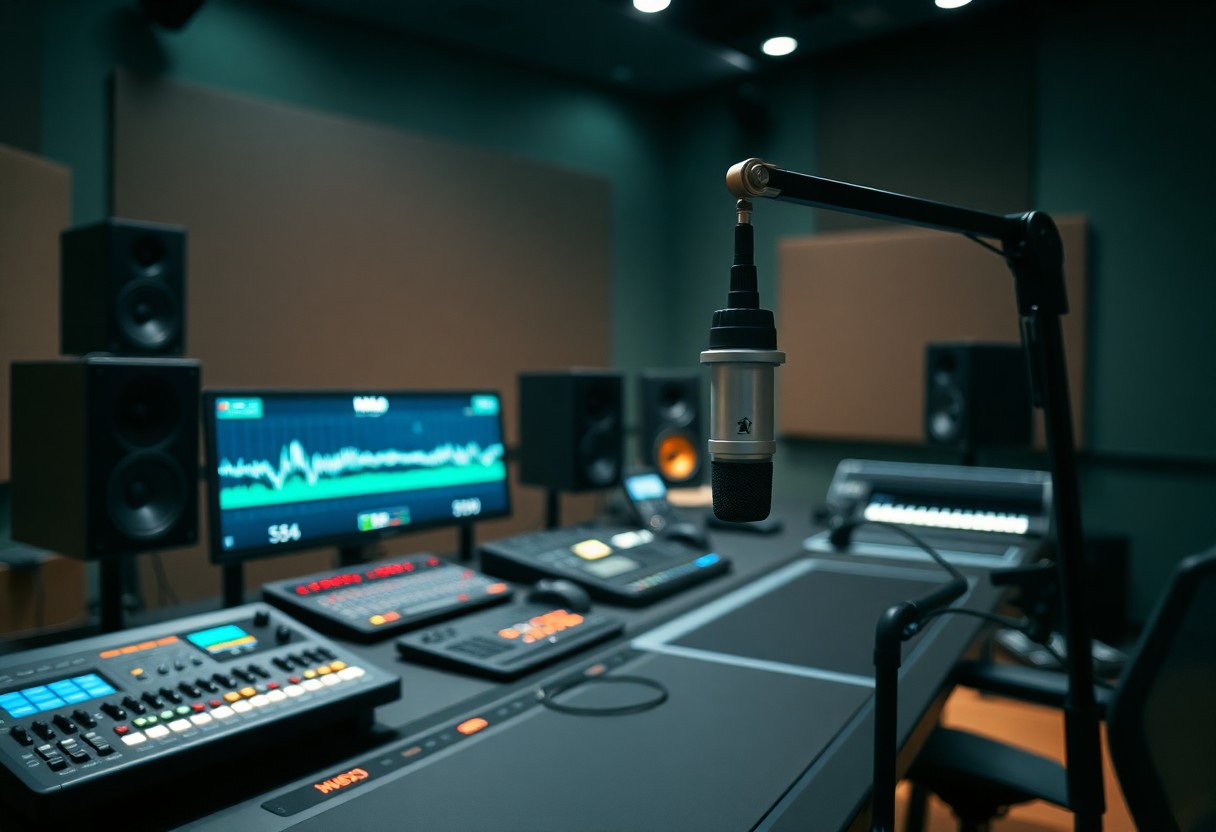Many aspiring and seasoned musicians alike are turning to AI music production tools to enhance their creative processes and streamline workflow. In this blog post, I will guide you through various AI tools that can help you compose, mix, and produce music with ease. You’ll discover how these innovative technologies can assist in generating melodies, providing suggestions, and even mastering your tracks. Let’s explore how AI can elevate your music production experience and unlock new possibilities for your sound creation.
Overview of AI in Music Production
To understand the impact of AI in music production, we must first recognize how technology has transformed the creative process. AI tools now support musicians and producers by offering innovative solutions for composition, mixing, and sound design. As these tools continue to evolve, they enable a more dynamic interaction between human creativity and machine efficiency, ultimately enhancing the overall music production experience.
Definition of AI Music Production Tools
With AI music production tools, you can leverage algorithms and machine learning to assist in various aspects of music creation. These tools can generate melodies, provide automated mixing and mastering services, or analyze tracks for stylistic trends. Essentially, they act as intelligent assistants, streamlining workflows and opening up new creative avenues for artists.
Historical Context and Development
One of the fascinating aspects of AI in music production is its historical evolution. The earliest experiments with computer-generated music date back to the 1950s, laying the groundwork for today’s AI tools. Over the decades, developments in artificial intelligence and machine learning have accelerated this evolution, culminating in the advanced systems we see today.
But the journey hasn’t been linear; it’s been marked by significant breakthroughs and challenges. From rudimentary algorithms that could barely replicate simple melodies to sophisticated neural networks capable of generating entire compositions, the development of AI in music has paralleled technological advancements in computing power. Today, you will find AI helping both seasoned producers and amateurs by making music creation more accessible, efficient, and incredibly versatile. Each step in this evolution has contributed to the impressive capabilities we enjoy in modern AI music production tools.
Types of AI Music Production Tools
While exploring AI music production tools, it’s vital to understand the various types available. They can enhance different aspects of the music creation process, making it more accessible and efficient. Below is a table summarizing some prevalent categories:
| Type | Description |
|---|---|
| Composition Tools | Assist in generating melodies, harmonies, and arrangements. |
| Songwriting Tools | Help in writing lyrics and structuring songs. |
| Mixing Tools | Automate the balancing of sound levels for tracks. |
| Mastering Tools | Finalize audio for distribution and streaming. |
| Performance Tools | Enhance live shows with AI-driven effects or backing tracks. |
Assume that understanding these categories helps you choose the right tools for your needs as a music creator.
Composition and Songwriting Tools
Music production has been revolutionized by composition and songwriting tools that utilize AI algorithms to inspire creativity. With features that generate chords, melodies, and even entire musical pieces, these tools serve as a valuable resource. They can analyze existing works to suggest unique combinations, enabling you to expand your musical repertoire effortlessly.
Mixing and Mastering Tools
Songwriting is just the beginning; refining your tracks with mixing and mastering tools is where the magic happens. These AI-driven applications assist in adjusting the overall sound quality and ensuring that each element of your track shines through. By analyzing sound frequencies and dynamics, they make recommendations that elevate your music to a professional standard.
Production techniques in mixing and mastering have seen great advancements with AI tools. They analyze your music and suggest adjustments based on established industry standards, making it easier for you to achieve a polished sound. Whether you are a seasoned producer or just starting, these innovations help streamline the mixing process, allowing you to focus more on your creative visions while enhancing the audio quality of your projects.
Benefits of AI Music Production Tools
All musicians and producers can gain valuable advantages from using AI music production tools. These technologies streamline the creative process, allowing you to save time while enhancing the quality of your music. With AI’s ability to analyze trends and music patterns, you can focus more on your artistry, enabling a more enjoyable and productive workflow.
Efficiency and Speed
Behind every successful project lies the efficiency offered by AI tools. These systems can quickly generate melodies, harmonies, and arrangements, significantly reducing the time it takes to produce a track. You can experiment with various ideas without the daunting commitment, allowing for a more fluid creative process.
Enhanced Creativity
Benefits arise when you harness AI technology to expand your creative horizons. AI can provide inspiration by suggesting chord progressions, rhythms, and sounds that you may not initially consider. It acts as a collaborative partner, pushing you to think outside the box and explore novel musical landscapes that elevate your artistry to new heights.
To truly appreciate the enhanced creativity that AI music production tools offer, I encourage you to explore how these systems can complement your unique style. They can propose fresh ideas, remix existing tracks, or even combine styles to create something entirely new. Rather than stifling your creative instincts, these tools can invigorate them, empowering you to create music that resonates with your vision while still offering exciting new possibilities.
Challenges and Limitations
For anyone venturing into AI music production tools, it’s vital to acknowledge the challenges and limitations inherent in these technologies. While they offer numerous advantages, they can also lead to inconsistencies and unexpected results. I encourage you to explore discussions on Which AI tools are you ACTUALLY using when making … to gain insights from other producers about their experiences.
Quality Concerns
Across the board, one of the significant challenges I often face is the varying quality of output produced by AI music tools. While some generate impressive results, others may lack the nuance and originality that a human composer can provide, leading to a DIY feel in the final product.
Ethical Considerations
Between copyright issues and the potential for devaluing human artistry, ethical considerations play a significant role in the adoption of AI tools in music production. It’s necessary to think about how these technologies impact your creative process and the industry as a whole.
Challenges surrounding ethical considerations are multifaceted. As I create music using AI, I find myself navigating the blurred lines between inspiration and imitation. The potential for AI-generated tracks to replicate existing works raises questions about intellectual property and credit. It’s necessary to reflect on how AI tools affect not only my artistic integrity but also the broader implications for other musicians and the music landscape.
Case Studies of AI Tools in Action
Not only have AI music production tools reshaped the industry, but their practical applications showcase their effectiveness. Here are some impactful case studies:
- Amper Music created over 100,000 tracks for use in various media, demonstrating efficiency in quick content creation.
- AIVA (Artificial Intelligence Virtual Artist) gained public attention when one of its compositions was performed by a real orchestra, highlighting the blend of AI and traditional music.
- Endlesss, a collaborative jamming platform, saw a 200% increase in user engagement after integrating AI-generated soundscapes.
- Landr, with its AI mastering tool, boasted over 10 million songs processed, reflecting the demand for automated production assistance.
Notable AI Music Production Tools
Notable AI music production tools like AIVA, Amper Music, and OpenAI’s MuseNet are revolutionizing how music is created. These platforms not only assist in composition but also analyze user input to generate tailored music experiences, enabling both amateur and professional musicians to push their creative boundaries.
Impact on Artists and Industry
After incorporating AI tools into my workflow, I’ve witnessed noticeable changes in the creative process and industry dynamics. Artists are transforming how they compose, collaborate, and distribute music, with AI-driven tools streamlining tasks and opening new avenues for creativity.
Plus, AI music tools have democratized music production, allowing artists from various backgrounds to access resources previously limited to major studios. This shift fosters innovation, as emerging musicians can experiment without financial constraints. Moreover, as the technology evolves, it encourages collaboration between human creativity and AI efficiency, ultimately reshaping the music landscape for everyone involved.
Future Trends in AI Music Production
Your exploration of AI music production tools reveals a landscape ripe with possibilities. As technology advances, I foresee AI playing an integral role in not just music creation, but also in the way we consume and experience music. The future promises smarter, more intuitive tools that will enable you to tap into your creativity like never before, changing the dynamics of the entire music industry.
Technological Advancements
Alongside rapid advancements in machine learning and neural networks, AI music production tools are becoming increasingly sophisticated. These innovations enable more precise sound manipulation, genre blending, and real-time collaboration, which empowers you to explore new sonic territories. As I continue to see improvements in user interfaces and accessibility, I believe that you will find AI tools more intuitive and user-friendly, allowing for seamless integration into your creative process.
Potential Industry Shifts
Music creation is evolving dramatically as AI-driven technologies push the boundaries of traditional production methods. To fully grasp the impact of these shifts, I envision a future where independent artists share the stage with AI systems, leading to a democratization of music creation. With AI tools allowing for enhanced creativity and more efficient processes, record labels may begin to prioritize innovative collaborations that merge human and machine talent. This new paradigm shifts the traditional gatekeeping role of the music industry, potentially leading to a more diverse and vibrant musical landscape.
Final Words
To wrap up, I believe that AI music production tools represent a significant shift in how we create and experience music. These innovative technologies offer you unparalleled opportunities to enhance your composition process and explore new sonic possibilities. By integrating AI into your workflow, you can streamline and elevate your music production, allowing your creativity to flourish. As we move forward, embracing these tools can empower you to push boundaries and redefine your musical expression. I encourage you to investigate into the world of AI and unlock its potential for your artistic journey.










